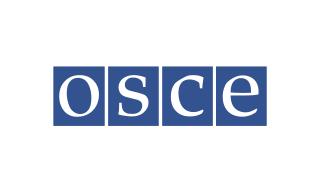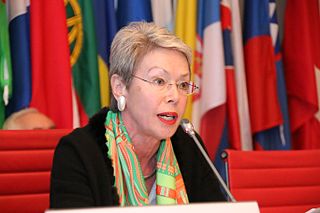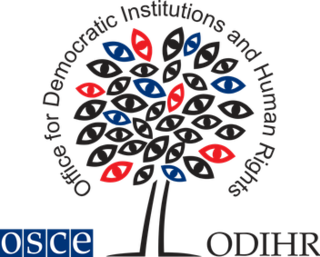
The Organization for Security and Co-operation in Europe (OSCE) is a regional security-oriented intergovernmental organization comprising member states in Europe, North America, and Asia. Its mandate includes issues such as arms control, the promotion of human rights, freedom of the press, and free and fair elections. It employs around 3,460 people, mostly in its field operations but also in its secretariat in Vienna, Austria, and its institutions. It has observer status at the United Nations.

Freedom of peaceful assembly, sometimes used interchangeably with the freedom of association, is the individual right or ability of people to come together and collectively express, promote, pursue, and defend their collective or shared ideas. The right to freedom of association is recognized as a human right, a political right and a civil liberty.

La Strada International (LSI) is an international NGO network addressing the trafficking of persons in Europe.

The Decade of Roma Inclusion was an initiative of 12 European countries to improve the socio-economic status and social inclusion of the Romani people across the region. The initiative was launched in 2005, with the project running from 2005 to 2015, and was the first multinational project in Europe to actively enhance the lives of Roma.

Ingibjörg Sólrún Gísladóttir is an Icelandic politician from the Social Democratic Alliance who has served as Minister for Foreign Affairs (2007–2009) and leader of the Alliance (2005–2009). She served as representative of UN Women in Afghanistan from 2012-2014 and later in Turkey as designated Regional Director for Europe and Central Asia.

The ethnic cleansing of Georgians in Abkhazia, also known in Georgia as the genocide of Georgians in Abkhazia, refers to the ethnic cleansing, massacres, and forced mass expulsion of thousands of ethnic Georgians living in Abkhazia during the Georgian-Abkhaz conflict of 1992–1993 and 1998 at the hands of Abkhaz separatists and their allies. Armenians, Greeks, Russians, and opposing Abkhazians were also killed.
The Caucasus Institute for Peace, Democracy and Development (CIPDD) is a Tbilisi-based think-tank founded in 1992. It is headed by the Georgian political scientist Ghia Nodia. Its main areas of research are: conflict prevention and resolution ; political parties; media, especially regional media; security studies and civil-military relations; local self-government development in Georgia, religious minority and education.

Miroslav Lajčák is a Slovak politician and diplomat, former Minister of Foreign Affairs of the Slovak Republic. In addition, Lajčák also served as President of the United Nations General Assembly for the 72nd session from 2017 until 2018.
Douglas Young FRSA TD DL WS, also known as Doug Young, is a former Scottish solicitor and reserve British Army officer.

Abkhazia, officially the Republic of Abkhazia, is a partially recognised state in the South Caucasus, on the eastern coast of the Black Sea, at the intersection of Eastern Europe and Western Asia. It covers 8,665 square kilometres (3,346 sq mi) and has a population of around 245,000. Its capital and largest city is Sukhumi.

Heidi Tagliavini is a Swiss former diplomat noted for her service with international aid and peacekeeping missions; a 2003 profile in the monthly magazine of the Neue Zürcher Zeitung called her "Switzerland's outstanding diplomat". She was charged with leading the European Union investigation into the causes of the 2008 Russo-Georgian war, and represented the OSCE in the 2015 negotiations about the Minsk II agreement concerning the war in Donbass.

The Office for Democratic Institutions and Human Rights (ODIHR) is the principal institution of the Organization for Security and Cooperation in Europe (OSCE) dealing with the "human dimension" of security. The Office, originally established in 1991 under the 1990 Paris Charter as the Office for Free Elections, is still best known for its role in observing elections although its name changed in 1992 to reflect the broadening of its by the Helsinki Summit.

Janez Lenarčič is a Slovenian diplomat who has been serving as European Commissioner for Crisis Management in the Von der Leyen Commission since 2019. He is a former Director of the Office for Democratic Institutions and Human Rights within the Organization for Security and Co-operation in Europe.

Michael Georg Link is a German politician of the Free Democratic Party (FDP) who has served a member of the Bundestag from 2005 to 2013 and again since 2017. In addition to his parliamentary mandate, he has been serving as the Coordinator of Transatlantic Cooperation at the Federal Foreign Office in the coalition government of Chancellor Olaf Scholz since 2022.

Anita M. Vandenbeld is a Canadian politician, who was elected to represent the riding of Ottawa West—Nepean for the Liberal Party of Canada in the House of Commons of Canada in the 2015 Canadian federal election. She was re-elected in the same riding in 2019, and re-elected in 2021.

OSCE Mission to Croatia was the field mission of the Organization for Security and Co-operation in Europe operating in Croatia in from July 1996 until the December 2007. The Mission become preeminent international organization in Croatia after the departure of UNTAES forces from the Eastern Slavonia, Baranja and Western Syrmia. Original Mission's was supposed to last until the 1999 and it consisted of 280 international personnel and 320 national staff deployed in twenty field offices and three regional coordination centers as well as the Zagreb headquarters. The first mandate adopted by the Permanent Council in April 1996 authorized the Mission to "provide assistance and expertise to the Croatian authorities at all levels, as well as to interested individuals, groups and organisations, in the field of the protection of human rights and of the rights of the persons belonging to national minorities. In this context and in order to promote reconciliation, the rule of law and conformity with the highest internationally recognised standards, the Mission will also assist and advise on the full implementation of legislation and monitor the proper functioning and development of democratic institutions, processes and mechanisms". On the 14 July 1997 United Nations Security Council Resolution 1120 urged the Government of the Republic of Croatia to cooperate fully with the OSCE mission in return of all refugees and displaced persons, protection of their rights, and the protection of persons belonging to national minorities. The annual budget of the Mission in 2000 was 21,086,900 euros. Along the Zagreb headquarters mission was operating from three co-ordination Centres in Vukovar, Sisak and Knin and 14 field offices. In the region of former Eastern Slavonia, Baranja and Western Syrmia mission operated the Police Monitoring Group in the 1998-2000 period but close it down in September 2000 due to the stable security situation in Croatia and notably in the Danube region. On the 21 December 2007 OSCE Permanent Council decided on closing the OSCE Mission to Croatia, on 31 December 2007, and keeping only the OSCE office in Zagreb. This office itself was closed on 17 January 2012. Croatia became full member state of NATO in 2009 and European Union in 2013.
Christian Strohal is an Austrian diplomat. He was formerly the director of the Office for Democratic Institutions and Human Rights from 2003 to 2008.

Matteo Mecacci is an Italian diplomat serving as director of the OSCE's Office for Democratic Institutions and Human Rights (ODHIR). In the past, he was a Radical Party Member of Parliament in Italy and elected in the lists of the Democratic Party, President of the International Campaign for Tibet and leading advocate for the International Criminal Court, the abolition of the death penalty, religious freedom and other prominent human rights campaigns.

Dame Audrey Francis Glover,, is a British international lawyer, experienced election observer, former director of Organization for Security and Co-operation in Europe Office for Democratic Institutions and Human Rights (1994-1997).
The Moscow Mechanism, established in 1991, is a confidence and security-building measure among the 57 participating States of the Organization for Security and Co-operation in Europe (OSCE). It complements and strengthens the Vienna mechanism, adopted in 1989. The two tools together constitute the so-called Human Dimension Mechanisms.
















